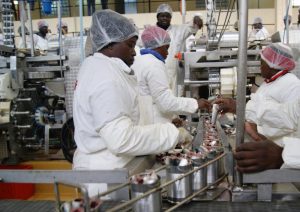-


The fishing industry is the cornerstone of the city’s economy. With more than 50 years in existence the fishing industry has developed into a leading force in the world’s fish supply market. Locally, the industry creates approximately 8,000 jobs and generates 10% of the country’s GDP. With more than 2 km of landing quays, cold storage, processing and canning facilities the fishing industry continues to play an important roll in the development of Walvis Bay.
High value fish and related products are processed for export purposes to niche markets in Europa, Australia, the United States and Hong Kong. 90% of the hake caught and processed is exported to the Spanish markets. Other fish species caught commercially include pilchards, anchovy, tuna, orange roughy, monk, sole, horse-mackerel and other demersal species.
The 3,500 hectare Walvis Bay salt field is one of the largest solar evaporation facilities in Africa, processing 24 million tonnes of sea water each year to produce more than 700,000 tonnes of high quality salt. The refinery recently installed the first robotic arm in the country which will drastically cut down on production time. Salt is shipped to markets in southern and west Africa. Walvis Bay Salt Refiners is also a commercial producer of high-quality oysters supplied to customers throughout southern Africa. The exploration for oil and gas along the Namibian Coast continues. If deposits were found, it would have a positive impact on Walvis Bay’s economy.
With the need for ship repair and maintenance well equipped engineering firms with a high degree of expertise have emerged to provide a wide range of services to the fishing and other industries. This has also spawned a wide range of other support industries such as shipping insurance, construction, cargo transport and retail services.
The Municipality of Walvis Bay has started to facilitate and promote the development of the informal trade and manufacturing industries. This includes providing training to start-up small and medium businesses (SMEs). The primary objective is to reduce the dependency of the local economy on the fishing sector, and to assist small traders to develop their businesses into fully fledged enterprises with the potential of exporting their products.
The main manufacturing activities take place within the Export Processing Zone. The EPZ companies are involved in the manufacturing of plastic products, automotive parts, fishing accessories, bathroom fittings and diamond cutting and polishing. Not only does the EPZ develop the country’s manufacturing industry but creates much needed employment.
Another emerging sector is tourism. To keep up with one of the fastest growing industries worldwide, Walvis Bay has upgraded its facilities and tourist attractions. The local accommodation and tour institutions now offer a high degree of quality services on par with international standards. This market has also contributed to the creation of more employment and the development of the city.
Walvis Bay has a natural deep-water harbour and offers an efficient and economical option for cargo transshipment between African, European and American trade markets. By using the port of Walvis Bay exporters and importers within the region are guaranteed a saving of at least eight to ten days when shipping to and from these markets. Rated as number one in Africa for efficiency and quality by the Africa Competitiveness Report, the port is capable of handling more than 6 million tonnes of cargo for export and import purposes.
The port is managed by Namibian Ports Authority (Namport), and is a gateway to 190 million consumers in the Southern African Development Community. It is well equipped with modern berth and cargo handling facilities, a syncrolift ship repair unit and ensures tight security.
Walvis Bay has an efficient transport network linking it to the hinterland and neighbouring African countries in the form of all-weather highways, district roads, a railway service and air links to Windhoek as well as other international airports in the region.
Rail services convey bulk commodities, general cargo, refrigerated goods, fuel and offer a comprehensive container service. Walvis Bay is linked to the rail networks of Namibia and Southern Africa. The Trans-Caprivi and Trans-Kalahari corridor road network cuts down on transport time for cargo. It forms a fast-flowing network that links Walvis Bay to major centres in South Africa, Botswana, Moçambique, Zimbabwe, Zambia, Angola, Democratic Republic of the Congo and other Eastern African Countries.
Walvis Bay enjoys a constant and high quality supply of potable water, while there is ample electricity supply for the local needs and new developments. Telecommunication services are second to none in Africa. High quality digital telephony, data, internet, satellite, cellular and radio communication services are available for all your needs. A large pool of skilled, semi-skilled and unskilled labour workers provide able support to investors. Walvis Bay has two hospitals and three clinics with highly qualified emergency and private medical practitioners.
Banking institutions provide comprehensive domestic and international financial services, to ensure the safe and fast transfer of funds to and from any centre of the world. Walvis Bay has several primary and secondary schools, a maritime training college, three libraries, distance education institutions and a museum. The Namibian Constitution guarantees freedom of expression. Walvis Bay has its own newspaper, the Namib Times and is covered by a vast network of radio, television and satellite channels.
Housing in Walvis Bay ranges from upmarket to medium-cost houses that are fully serviced with water, electricity, sewage and surfaced roads. Hotels, lodges and resorts cater for the tourist market with a high standard of accommodation and related services.